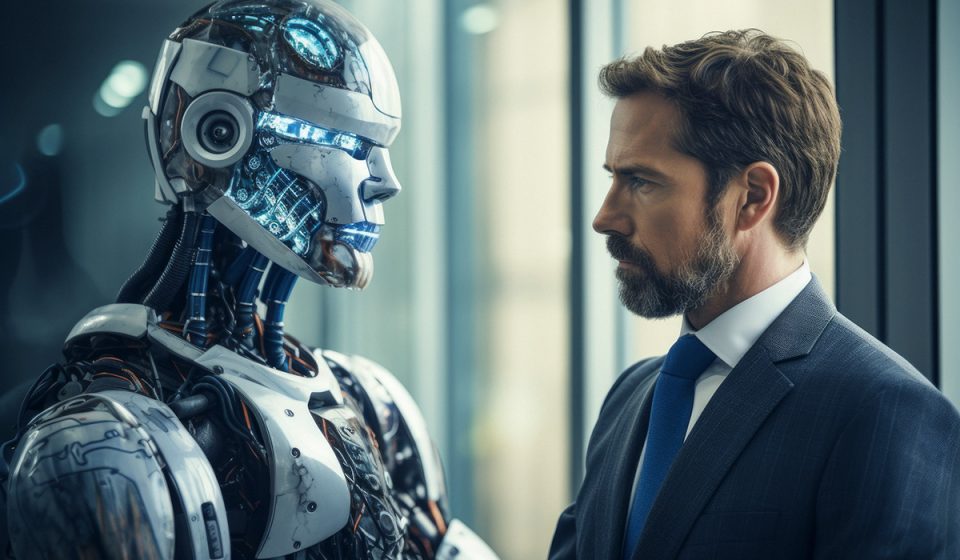
Are Your Client-Company Relationships at Risk Because of AI? Navigating the Future of Client-Firm Connection
The legal industry is undergoing a major transformation, with artificial intelligence (AI) at the forefront. From document review and contract drafting to legal research and client communication, AI is revolutionizing how law is practiced. But with all the buzz about boosting efficiency, reducing costs, and automating tasks, there’s one important question that’s often overlooked:
Table Of Content
- What happens to the human connection in legal services?
- ⚖️ Clients Want More Than Just Speed
- 🧠 Trust Isn’t Built by Algorithms
- 🤖 The Risk of Over-Automation
- 💡 So, How Do You Future-Proof Your Relationships?
- 1. Use AI to Enhance, Not Replace
- 2. Double Down on Communication
- 3. Invest in Emotional Intelligence Training
- 4. Be Transparent About AI Use
- 5. Personalize Client Interactions
- 🌱 The Opportunity: Blending Tech and Humanity
- Final Thoughts: AI Is Here to Stay, But Relationships Are Everything
What happens to the human connection in legal services?
And perhaps even more pressing: Could your client-firm relationships be at risk because of AI?
Let’s unpack the realities, the risks, and the opportunities that come with integrating AI into legal practice — while preserving the irreplaceable value of human connection.
⚖️ Clients Want More Than Just Speed
Sure, AI can generate faster responses, streamline repetitive workflows, and handle mundane tasks that once ate up valuable hours. But clients don’t just want speed — they want trust, understanding, and partnership.
They’re not looking for an answer as much as they’re looking for guidance. Context, empathy, and the reassurance that comes from having a seasoned professional by their side are what clients truly value. When firms rely too heavily on AI tools and lose sight of the personal connection, clients start feeling like they’re talking to a machine, not a lawyer who understands their needs.
Clients want to feel heard. They want someone who takes the time to explain complex legal language in a way that makes sense and feels personal. If your firm leans too heavily on automation, your clients may start to feel like they’re just another case number — not a person with unique concerns.

🧠 Trust Isn’t Built by Algorithms
Trust is the cornerstone of the legal profession. It’s built over time through consistent, empathetic communication, and through a lawyer’s ability to not only interpret the law, but to read the room — to understand the emotional and psychological needs of their clients, especially in moments of crisis.
AI may be able to assist with information gathering, document generation, or even predicting outcomes based on historical data, but it can’t build trust. It doesn’t have the emotional intelligence to sense when a client is nervous before a trial or when they need a little extra reassurance. AI doesn’t understand nuance in the way humans do. It can’t comfort a client after a devastating injury or help a business owner through a complicated legal dispute with the empathy that a skilled attorney can.
Clients will remember how you made them feel — not just how quickly you processed their legal documents. In high-stakes situations, it’s the lawyer’s human connection that matters most.
🤖 The Risk of Over-Automation
As firms look to optimize everything, there’s an undeniable temptation to over-automate. While AI is a powerful tool, over-relying on it for client communication (emails, updates, Q&A sessions) can create a real disconnect.
Imagine the scenario: You’re going through a personal crisis — maybe a divorce or a serious injury — and you get an automated email or a chatbot response offering legal advice. Is it efficient? Yes. Is it effective? Maybe. Is it human? Absolutely not.
This kind of detachment can leave clients feeling unimportant, neglected, or misunderstood. Clients remember how they felt during their most vulnerable moments, and a sterile, automated interaction doesn’t resonate the same way as a personal touch does. Efficient doesn’t always mean effective — especially when it comes to building and maintaining client relationships.
💡 So, How Do You Future-Proof Your Relationships?
The legal firms that will thrive in the age of AI are the ones that understand the balance between technology and the human touch. Here are a few strategies that can help you blend the benefits of AI with the personal connection your clients deserve:

1. Use AI to Enhance, Not Replace
Leverage AI for repetitive tasks such as contract review, document drafting, and case research, but make sure your attorneys are still involved in client-facing interactions. AI can free up time so lawyers can focus more on the human elements of legal work — like strategy, empathy, and relationship-building.
2. Double Down on Communication
AI might handle the paperwork, but nothing replaces the value of a personal check-in with your clients. Regular, human-led updates — whether it’s through phone calls, video conferences, or face-to-face meetings — show clients that you see them as people, not just cases.
3. Invest in Emotional Intelligence Training
In a world increasingly driven by algorithms and data, emotional intelligence (EQ) is a key differentiator. Train your lawyers in skills like active listening, empathy, and conflict resolution. These are the “soft skills” that AI can’t replicate and are critical in building trust and rapport with clients.
4. Be Transparent About AI Use
Clients value transparency. Make sure to explain when and how AI is being used in their cases. Acknowledge that technology is a tool to enhance efficiency and reduce costs, but emphasize that the human element of the firm is what truly drives the outcomes.
5. Personalize Client Interactions
AI can analyze vast amounts of data, but personalized service still goes a long way. Use the data that AI generates to customize your approach to each client, tailoring your legal strategy and communication style to their specific needs and preferences.

🌱 The Opportunity: Blending Tech and Humanity
The firms that will succeed in this new era are not necessarily the ones with the most cutting-edge AI but those that understand how to use technology to support and amplify human relationships.
AI can’t replace the human connection that is central to legal practice, but it can empower lawyers to be more effective, more efficient, and more responsive to their clients’ needs. The key is to ensure that AI complements the human side of your practice — not replaces it.
Final Thoughts: AI Is Here to Stay, But Relationships Are Everything
As we continue to embrace AI in the legal field, it’s essential to remember that relationships — the core of the legal profession — will always be the most powerful factor in client retention and satisfaction.
The smartest firms won’t just ask, “What can AI do?” but will also ask, “How can we use AI to serve our clients even better, while maintaining the human connection that is at the heart of our work?”
Because, in the end, it’s not AI that will win cases or retain clients.
It’s you — the lawyer who understands, listens, and truly cares.


